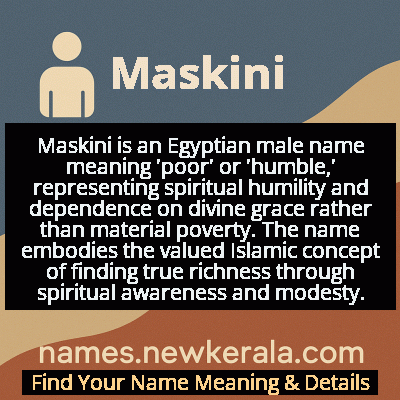Maskini Name Meaning & Details
Origin, Popularity, Numerology Analysis & Name Meaning of Maskini
Discover the origin, meaning, and cultural significance of the name MASKINI. Delve into its historical roots and explore the lasting impact it has had on communities and traditions.
Name
Maskini
Gender
Male
Origin
Egyptian
Lucky Number
4
Meaning of the Name - Maskini
Maskini is an Egyptian male name meaning 'poor' or 'humble,' representing spiritual humility and dependence on divine grace rather than material poverty. The name embodies the valued Islamic concept of finding true richness through spiritual awareness and modesty.
Maskini - Complete Numerology Analysis
Your Numerology Number
Based on Pythagorean Numerology System
Ruling Planet
Uranus (Rahu)
Positive Nature
Strong sense of order, loyal, practical, and disciplined.
Negative Traits
Stubborn, overly serious, rigid, and prone to feeling restricted.
Lucky Colours
Blue, gray.
Lucky Days
Saturday.
Lucky Stones
Blue sapphire.
Harmony Numbers
1, 7, 8.
Best Suited Professions
Managers, engineers, accountants, organizers.
What People Like About You
Dependability, discipline, practicality.
Famous People Named Maskini
Maskini Ali
Religious Scholar
Prominent Quranic teacher in Zanzibar who established madrasas for underprivileged children
Maskini Hassan
Poet
Influential Swahili poet known for works exploring themes of humility and social justice
Maskini Jabir
Community Leader
Founded cooperative farming communities along the Nile Delta promoting economic empowerment
Maskini Farouk
Musician
Award-winning oud player blending traditional Egyptian music with modern influences
Name Variations & International Equivalents
Click on blue names to explore their detailed meanings. Gray names with will be available soon.
Cultural & Historical Significance
Throughout Egyptian history, names conveying humility have been particularly common among religious scholars and mystics who embraced simplicity as a path to enlightenment. In contemporary Egyptian society, the name continues to symbolize modesty, contentment, and spiritual awareness, often chosen by families wishing to instill values of humility and gratitude in their children. The name serves as a constant reminder of the transient nature of material wealth and the enduring value of spiritual fulfillment.
Extended Personality Analysis
Individuals named Maskini are typically characterized by their profound humility, deep empathy, and strong spiritual awareness. They often possess a calm, contemplative nature and demonstrate remarkable resilience in facing life's challenges. Their humility is not weakness but rather a source of inner strength, allowing them to connect genuinely with people from all walks of life without pretension or arrogance.
These individuals tend to be excellent listeners and natural peacemakers, often sought out for counsel during conflicts. They exhibit strong intuitive abilities and a practical approach to problem-solving. While they may appear reserved initially, they form deep, lasting relationships based on mutual respect and understanding. Their contentment with simple pleasures and lack of material ambition often masks a rich inner world and strong moral compass that guides their decisions and actions.
Modern Usage & Popularity
In modern times, Maskini remains a meaningful though uncommon choice for Egyptian families, particularly those with strong religious or traditional values. The name has experienced a modest resurgence among educated urban families seeking names with deep cultural and spiritual significance. While not among the most popular names statistically, it holds special appeal for parents wanting to emphasize values of humility and spiritual awareness in an increasingly materialistic world. The name is most commonly found in Upper Egypt and among families with Sufi affiliations, though its usage has spread to cosmopolitan areas as Egyptians rediscover traditional names with profound meanings.
Symbolic & Spiritual Meanings
Symbolically, Maskini represents the virtue of spiritual poverty - the conscious emptying of ego and worldly attachments to make room for divine grace. It embodies the paradox that true richness comes from recognizing one's need for higher guidance. The name serves as a metaphor for the vessel that must be emptied to be filled, the soil that must be cleared to receive new seeds. In Egyptian symbolism, it connects to the Nile's annual flooding - the fertile poverty of dry land that must precede the abundance brought by the floodwaters. It represents the wisdom that sometimes having less materially means possessing more spiritually, and that humility is the foundation upon which true character is built.

